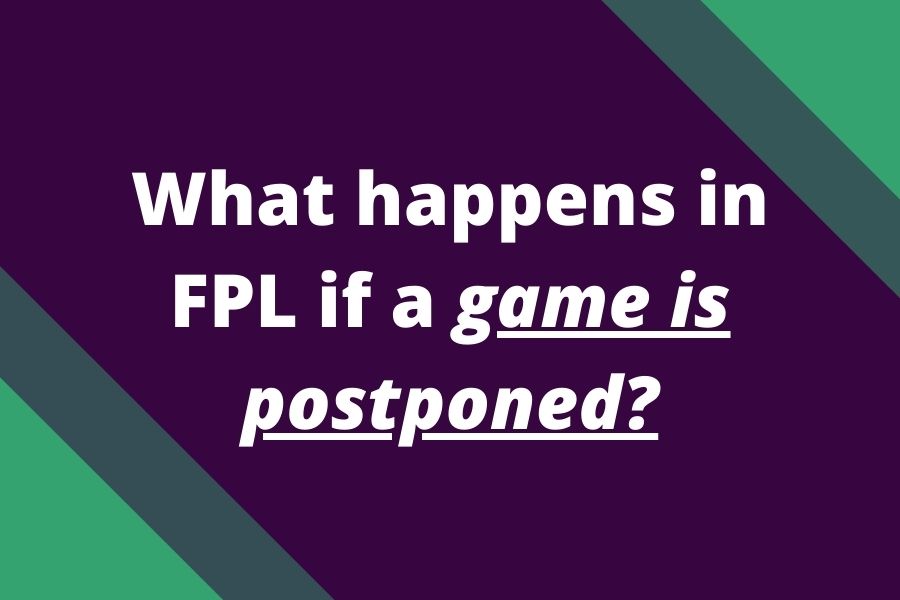Football games can sometimes be postponed due to various reasons such as adverse weather conditions, fixture congestion, or other unforeseen circumstances. This article delves into what happens in FPL when a game is postponed, how it impacts player selection and points, and how FPL managers can navigate these situations.
Summary:
Gameweek where a match is postponed = some teams do not play = blank gameweek = blank players score 0 points.
Gameweek where matches are rescheduled to = some teams play twice = double gameweek = some players can score you points from 2 matches in one gameweek.
Understanding Postponed Matches in FPL
When a Premier League match is postponed, it means that the players from the affected teams who are in your FPL team will not be able to earn points for that particular Gameweek. This will result in a “blank gameweek” – a gameweek where less than 20 teams have a fixture. So all players that have a blank gameweek will score you zero points on that particular gameweek.
Read more: What is blank gameweek in FPL?
However, if the match is rescheduled within the same Gameweek, then any points earned by your players in the rescheduled match will still count for that Gameweek. But if the match is moved out of the Gameweek, then your players from the affected teams will not score any points for that Gameweek. Instead, they will be replaced by your bench players, provided that the matches involving your bench players go ahead.
What happens if a match is abandoned during the gameweek?
In 2023/24 Gameweek 19, the Bournemouth vs. Luton game was interrupted in the 58th minute (and later called off) after Tom Lockyer’s cardiac arrest. Premier League confirmed that the game would be replayed in full later in the season.
So all FPL points that players earned in GW19 in the abandoned match were voided – all players from that match ended Gameweek 19 on zero points, as in a blank gameweek (so they were subbed off in FPL teams for bench players).
Following the announcement @afcbournemouth v @LutonTown will be replayed in full at a later date, Gameweek 17 will now be closed and the game will update shortly.
Points achieved by players in the original fixture will be voided. Normal auto-subs and vice-captain rules apply. https://t.co/jkm7sA3Gcf
— Fantasy Premier League (@OfficialFPL) December 20, 2023
Impact on Player Selection and Points
The postponement of a match can have a significant impact on your FPL team, especially if you have multiple players from the affected teams.
This is where the importance of having a playing bench comes into play. In situations where matches are postponed, your first substitute will come into your starting XI for any of your players who don’t play, followed by the second and third substitutes if necessary. Therefore, it’s crucial to ensure that your bench players are regular starters for their respective teams, as they could be called upon to come into your team when matches are postponed.
Read more: How does bench work in FPL?
Rescheduling of Postponed Matches
When a Premier League match is postponed, it is typically rescheduled for a later date. Usually, the match is moved to a different Gameweek, and this gameweek is called a double gameweek.
Read more: What is a double gameweek in FPL?
A Double Gameweek occurs when a team has more than one match in a single Gameweek due to rescheduling. This can provide an opportunity for FPL managers to earn extra points, as players from the teams playing twice will have two opportunities to score points.
Strategies for Dealing with Postponed Matches
Dealing with postponed matches can be challenging, but there are strategies that FPL managers can employ to navigate these situations:
- Stay informed: Keep up to date with the latest news regarding match schedules. Knowing in advance that a match is likely to be postponed can help you make informed decisions about player transfers and team selection.
- Have a playing bench: As mentioned earlier, having a playing bench is crucial. Your bench players can come into your starting XI when matches are postponed, so ensure these players are regular starters for their respective teams.
- Plan for Double Gameweeks: If a postponed match is rescheduled for a later Gameweek, it can result in a Double Gameweek. This can be a great opportunity to earn extra points, so consider this when planning your transfers and team selection.
- Plan to use your chips around big blank gameweeks and double gameweeks in the second half of the season: The FPL chips – Wildcard, Free Hit, Bench Boost, and Triple Captain – can be particularly useful during big Blank and Double Gameweeks. Plan to use your chips around these critical periods in the second half of the season. For instance, the Free Hit chip can be a lifesaver during a Gameweek with multiple postponements, allowing you to field a full team of players who are actually playing that week. Usually big blank and double gameweeks occur in the second half of the season due to the clashes with FA Cup matches.
Read more: When is the next double gameweek in FPL?
Conclusion
In conclusion, while postponed matches can pose challenges in FPL, they can also provide opportunities. By staying informed, maintaining a playing bench, and planning for Double Gameweeks, FPL managers can navigate these situations effectively. Remember, FPL is a game of strategy and adaptability, and dealing with the unexpected is part of the challenge.




